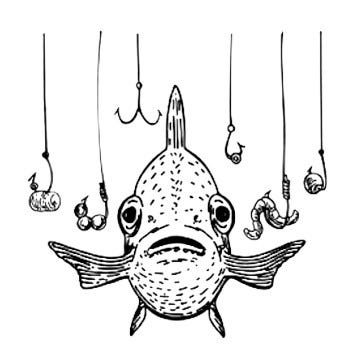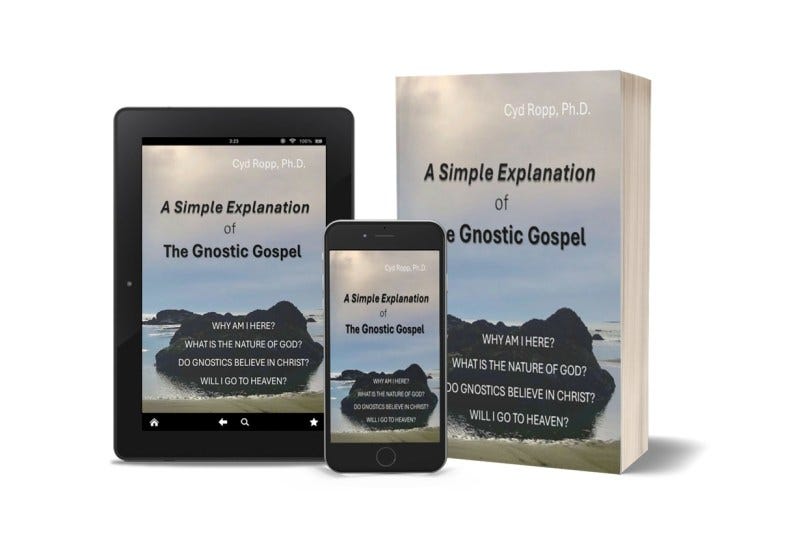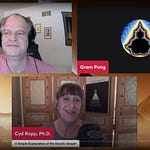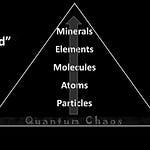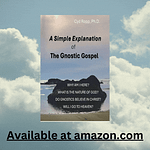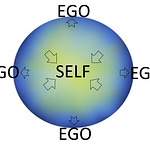Welcome back to Gnostic Insights and the Gnostic Reformation on Substack. Today I’m going to read one of the books out of the Nag Hammadi that we haven’t talked about before. It’s called Authoritative Discourse, Authentikos Logos, and it was part of the original Nag Hammadi codices. I’ve been thinking of codices as scrolls but actually they were the first form of bound books. It’s a very short book, unlike the Tripartite Tractate, which is the second longest book in the Nag Hammadi. This is one of the shortest books in the Nag Hammadi, but it was very well preserved except for the first page. It had gotten damaged and is missing a few words, but the rest of it’s intact.
And I think it’s such a lovely book, and it goes so well with our Gnostic Gospel teaching, that we’re going to talk about it today. This book is not particularly Christian because it doesn’t talk about the Savior, but what it does talk about a lot is the Spirit and the Soul. And these are two characters represented in this book as a fiancé, the Spirit, which we call the Self, and then the main character is called the Soul, but we refer to that as the Ego. So it’s about the split between the Self and the Ego, and what drives them apart, and what brings them together. It begins with talking about the Fullness, or the Aeon of Aeons, is what I call it. And it says, From the Fullness,
From these, came the invisible Soul of Righteousness. One member with them, one body with them, one Spirit with them. Whether she’s coming down or is in the realm of the Fullness, she is not apart from them, but they see her and she looks at them through the invisible Word, or Logos.
And by the way, this Soul, which I identify as the Ego, is characterized as a female gender, and the Self is characterized as the male gender. We haven’t talked about gendering the parts of our Soul like that, but in this Authoritative Discourse, they’re a betrothed couple. They belong together, though they have not yet joined each other. It says,
Secretly her bridegroom, [that’s the Self], obtained the Word, [that’s what we call Logos]. He held it to her mouth to make her eat it like food. He applied it to her eyes like medicine, to make her see with her mind, and perceive those who are kin to her, and learn about her root, that she may be able to hold on to the branch from which she has come, receive what is hers, and renounce matter.
So this is talking about how the Self is instructing the Ego not to become lost in this world. Then there’s a little discussion about when a man marries a woman who already has previous children from another marriage, how those are different children than the children that he fathers with her, and that the children that he fathers with her are his genes, belong to him as well as to her when it comes to inheritance. And so this is a metaphor for our Self and our Ego to be wed to one another. This metaphor refers to after the Ego comes down to this fallen world, and leaves the Fullness of God, that the marriage she has is to our physical material body, and the children that she begets by the material body are her stepchildren, and that they possess the inheritance of their father, which are, get this,
exalted passions, life’s pleasures, hateful jealousies, boastful expressions, foolish experiences, reproachful words.
And then there’s a few more missing words here, and it says,
If a soul, [and whenever I say soul, think Ego], if a soul who is ignorant chooses a spirit of prostitution, he casts her out and throws her into a brothel. He has left her to corruption because she has abandoned modesty.
That is, the Self, which is still above in the Fullness, allows the fallen Ego to experience the material world, to revel in lust and other material pleasures. It says,
Death and life are placed before everyone, and people choose for themselves which of these two they want. That soul will fall into drinking too much wine in a corrupt manner. Wine corrupts. The soul forgets her siblings and her Father.
And by the way, her siblings are the other Aeons up in the Fullness of God, or the other parts of her aeonic inheritance that live in the Fullness.
The soul forgets her siblings and her father, and sensual pleasures and sweet things deceive her. She has abandoned knowledge and has fallen into the life of an animal. A person devoid of sense lives like a beast, not knowing what one should say or should not say.
So now we’re describing the state of our Ego when it is not aware of itself, or of Logos above, or the Fullness of God.
The gentle child inherits with joy from the father, and the father rejoices over his child, because everyone praises the father on account of the child, and the child also looks for a way to duplicate what was received.
So you see, when we are remembering the Father above, we look for a way to behave like the Father, and so everyone can see the Father by our actions.
On the other hand, the stepchildren, [and then there’s some missing words], their lust cannot mix with sobriety.
So if you’re sober, and you’re walking with yourself and the Father, you will not mix with the lust of the world. They are like oil and water, they don’t blend.
If a lustful thought arises in a person who is a virgin, that person already has become contaminated. This sort of appetite cannot mix with moderation.
And so what that was saying is that even if you are physically a virgin, if you are lusting with your eyes, as Jesus said, you have already committed adultery in your heart. And so what we’re talking about is purity of heart versus coveting what the world has to offer. So even if you behave in a strict manner, and you never give in to the world, but you lust after it, or you covet it, or you watch TV shows that inspire you to want it, then you’re already doomed in that sense, because lust cannot mix with sobriety. It says,
For if chaff is mixed with wheat, it is not the chaff that is contaminated, but the wheat. Since they are mixed together, no one will buy the contaminated wheat. They will coax the dealer and say, give us this chaff, for they see the wheat mixed with it. Then they will take the chaff and throw it out with the rest of the chaff, and that chaff will become mixed with all the other material stuff. Pure seed is kept in storehouses that are secure. We have now discussed all these things, it says.
So you understand that metaphor of the chaff and the wheat? That’s also a biblical metaphor that Jesus talked about in his parables. [There’s some weeds that look like wheat that grow up amongst the wheat, and you can’t weed them out—it’s too much, it’s in the way. So if you’ve allowed the chaff to grow with the wheat, and it’s harvested with the wheat, the wheat is no good for wheat anymore. It is as good as chaff, and you have to just give it away, because no one wants to buy it. Oops. I was think of the wheat and the tares—different parable!] The chaff is the inedible outer part of the wheat berry that is discarded during processing. And this is a metaphor for our fallen soul. Our Self is not fallen. It remains in the Fullness, or it remains connected to the Fullness. It comes down with us, but it is not sullied. It still reflects the purity of the Father—it’s the bridegroom in the metaphor. But our Ego, which this book calls the soul, can become contaminated by the world, and that’s the chaff amongst the wheat. Going on,
Before anything was, the Father alone existed. Before the worlds in the heaven appeared, or the world on Earth, or principalities or authorities of powers appeared, nothing came to be without the Father’s will. The Father wished to reveal His wealth and His glory, and so He established a great contest in this world. He wanted to make the contestants come up and leave behind what is of the created world, and despise these things with exalted, incomprehensible knowledge, and run to the One who is.
We are to be triumphant over the ignorance of those who contend with us, the adversaries who contend against us, through our knowledge, [which is another word for gnosis], for we already have known the inscrutable One from whom we have come. We have nothing in this world, or else the world’s authority that came to be might hold us back in the worlds of the heavens, where death is universal, surrounded by individual …… [There’s missing words.] We now have been put to shame in the worlds, but we are not interested in them when they speak ill of us. We ignore them when they curse us. We stare at them in silence when they treat us shamefully, directly to our face.
And by the way, this is good advice for how to react to unkind people who don’t love God when they make fun of you for your spiritual beliefs. It says,
We are not interested in them when they speak ill of us. We ignore them when they curse us. We stare at them in silence when they treat us shamefully, directly to our face.
So we’re not supposed to argue back. We’re not supposed to call them names back. This has always been a problem of mine. I get angry about it, and I start just reflecting what they’re giving to me. I reflect back on them. Well, that’s not right at all. And in the past few years, as I’ve been developing in my gnosis, I’ve calmed down about that tremendously. I no longer get in fights with random strangers about these things. I used to think it was righteous indignation, but there’s no such thing. There’s anger, and that doesn’t belong in the Fullness of God. That’s all there is to it. What comes from the Fullness and what we are to reflect of the Father is love. And if we cannot speak in love to another person who is acting shamefully, then we should just stare at them in silence and move on. Don’t fight back, it says.
They go about their business, and we go about in hunger and thirst, looking to our dwelling place, which we perceive through our lifestyle and our conscience.
And that dwelling place for us, that’s the Fullness of God. That’s the remembrance of the Fullness above. And we’re to be in constant contact with the Fullness as much as we can.
You know, I’ve mentioned this to you before. I’ve been blessed with this wonderful blessing—that many times, if not most times, that I look at the clock, it’s one of the amazing numbers that I love: 2:22, 3:33, 4:44, 5:55, 11:11, 12:34, and so on. So these kind of meaningful numbers, they may be, I don’t know if they’re silly or not, however, they remind me of the levels of the Fullness. I think of the hierarchy of God. I see 1:11, and I see the top of the pyramid. I see 2:22, it’s the next level down. 3:33, it’s the next level down. So I’m seeing the hierarchy, and that’s what the numbers on the clock remind me of. When I just happen to be walking by, and I glance up, and there’s 4:44, I cross myself, I look up to the Fullness, and I connect with 4:44. I don’t know if this is valid. It’s certainly a practice. It reminds me of the Fullness of God, and that’s what this part was saying. Quoting that part again,
They go about their business, and we go about in hunger and thirst, looking to our dwelling place, which we perceive through our lifestyle and our conscience. [And I would say, for me, through the digital clock.] We do not hang on to created things, but we withdraw from them. Our hearts are set on what truly is, and although we are sick, weak, and in pain, there is great strength hidden within us. Our soul is sick because she lives in a house of poverty, and matter strikes her eyes in order to blind her.
That’s such a true statement. The only reason we can’t see infinitely, as we can up in the Fullness, is because matter is dense and thick, and it’s slowed down all those vibrations into our apparently material world. It literally makes us blind. We can’t see through walls down here, but I think we can see forever up above.
For this reason, the soul pursues the word. [Okay, so, for this reason, our Ego pursues Logos] and applies it to her eyes as medicine, and she opens her eyes and casts off blindness. After that, if such a one is in ignorance once again, that one is in complete darkness and is a material being. That is why the soul always takes a word and applies it to her eyes as medicine, so that she may be able to see. Then her light may overwhelm the foes that oppose her, and she may blind them with her light, capture them in her presence, make them collapse in exhaustion, and act boldly with her strength and her scepter.
Okay, see, I think this is what we’re supposed to be doing instead of talking back and fighting. We’re supposed to capture them, blind them with the light that exudes from our Self through our eyes by having applied the gnosis to ourselves rather than their bad words that they’re giving us. And they can tell that we are in connection with the Fullness of God when we do that. So we stand in silence, we think on the Fullness, we praise God, we recognize the Third Order powers that live within us, and we look on them with love, and there’s no denying that. It will drive them crazy if they’re in a hateful mood to see the love of God that comes from us. So says me. It goes on to say,
While her enemies look at her in shame, she flees up to her treasure house where her mind is, to her storehouse which is secure.
And that is what? That’s our Self. That’s our encapsulation of the Fullness of God that is within us.
No one in creation has been able to grasp her, for she has taken no stranger into her house. Many of those born in her house oppose her day and night, and they do not rest day or night, for their lust oppresses them. This is why we do not fall asleep and forget about the nets hidden from view that are lying in place to catch us. For if we are caught in a single net, it will swallow us down within it, and water will wash over us and splash into our faces, and we shall be pulled down into the dragnet. We shall not be able to come up from the deep, because the water is high above us, flowing down from above, making our hearts sink down in filthy mud. We shall not be able to get away from them.
Okay, you get that. That’s a warning not to be caught in the lies of this world. And you know what’s going to do that? The news, or social media, or hanging around with the wrong people, or hanging out at bars and getting drunk, or watching ungodly television that is evil. Those are the nets that are strewn in our way to capture us.
Man-eaters will grab us and consume us, and they will enjoy themselves like a fisherman who is casting a hook and line into the water. For a fisherman casts different kinds of bait into the water, because each kind of fish has its own food. The fish smells the food and swims after the fragrance of the food, but when it bites into the bait, the hook hidden within snares it and draws it up by force from the deep water.
You see, that’s us. Why? You get it—we’re the little fishies. And the hooks and the bait are all the things that tempt us, that we want. You know, that expression we still have out of this type of book: We‘ve swallowed those lies, hook, line, and sinker. That’s what this parable is.
Nobody can catch that fish down in the deep water unless a fisherman finds a way to trap it. By tricking the fish with food, the fisherman has caught the fish on the hook.
We live like this in the world, like fish. The adversary is on the lookout for us and is lying in wait for us, like fishermen, to catch us. The adversary is delighted to consume us. He dangles many kinds of food before our eyes, the stuff of this world, because he hopes to make us desire just one kind of food and to taste only a little of it, that he may then catch us with his hidden poison and take us from freedom into slavery. For when he catches us with a single kind of food, we cannot help but desire the rest of the food. In the end, such things become the food of death.
In other words, once you start nibbling on one sort of vice, the other vices become much more appealing and you start eating them. Before you know it, you’re eating the whole banquet of vice and you’re being brought down into the snares of death.
These are the kinds of food with which the devil lies in wait for us. First, he plants pain in your heart so that you feel heartache over something trivial in this life, and he catches us with his poisons. After that, he introduces the desire for an article of clothing so that you will be proud of it. And then, love of money, pride, vanity, envy, rivaling envy, beauty of body, and covetousness. The worst of all of these are ignorance and laziness. All such kinds of food the adversary prepares in an attractive way and spreads it out before the body. The adversary wants to make the thought of the soul turn the soul to some kind of food, and thus he hopes to overwhelm her.
As with a hook, he draws the soul by force, in ignorance, and deceives her until she conceives evil and bears fruit of matter and behaves badly, pursuing many desires and cravings, seduced in ignorance by the pleasure of the flesh.
When I hear this, I just think social media all over the place, right? All this covetousness. Look what I’ve got. Here, I’m posting it. Look what I just bought. Look, I’m posting it. Look what I’m eating. Look, I’m posting it. And all the Selfies, selfies, selfies. Here is a selfie of me here, and here’s a selfie of me there, in order to induce longing in other people, in order to induce jealousy, covetousness. Those are the hooks and the bait to capture people. So, unwittingly, people are putting bait on the hooks of the Demiurge and capturing other people. We certainly do not want to do that. Stay away from Facebook like the plague, Instagram, TikTok. These are not good. So says me.
The soul who has tasted these things has come to realize that sweet passions are fleeting. She has learned about evil, has forsaken these passions, and has adopted a new lifestyle. After her experiences, the soul disdains this life because it lasts for only a time. She seeks the kinds of food that will bring her life, and she leaves behind the food of falsehood. She learns about the light, and she goes about and strips off this world. Her true garment clothes her within, and her bridal gown reveals beauty of mind rather than pride of flesh. She learns about the depth of her being. She runs into her sheepfold as her shepherd stands at the door. In return for all the shame and scorn she experienced in this world, she receives 10,000 times as much grace and glory.
Amen, and praise God to that! I can relate to that. This is true, and the longer you walk in the path of gnosis, the more you will realize this.
The soul returned the body to those who had given it to her. They were ashamed, and those who deal in bodies sat down and wept because they could not do their business with that body, and that was the only commodity they had. They had gone to great pains to shape the body for this soul, and they had intended to bring down the invisible soul.
Okay, so these are the marketers. These are the peddlers of things that they want us to buy, and things they want us to buy into, and they can see they’re not catching us, and it brings them shame because they have lost that fight for our body, for our soul.
They were ashamed of what they had done, for they had lost what they had worked hard to accomplish. They did not realize that the soul has an invisible spiritual body, but they thought, we are her shepherd, and we feed her.
You see, that’s the way it is in the world. That’s why they don’t understand it. They don’t believe there is a Self, or a Fullness of God, or a Father, or a Good Shepherd. They think it’s all fairy tale. They think it’s all made up, and they say rude things about believing in fairy tales, but we know better because we are in touch with our Self and the Fullness of God, with the Father and the Christ. So we know different. And I’ve often used the metaphor, it’s as if we can see what other people cannot see. We’re not making this up. This is not blind faith. When we begin to mine our gnosis, we see. Our eyes are opened, like Saul on the road to Damascus—how the scales fell from his eyes, and suddenly he could see the glory of God and Christ for the first time. We can see it. We’re not guessing it.
They did not realize that she knows another way hidden from them. This is what her true shepherd taught her in knowledge, [which is, of course, in gnosis].
And the Demiurge forgets these things too. The Demiurge is in the same condition as our ego. The Demiurge is the ego of Logos, and so that is the fractal level up from us. We are fractals of that split between the original Aeon, known as Logos, and his ego, which has become marooned down here in this material world. So all these things that it was saying about our soul and our spirit, or our Ego and our Self, it all applies to poor old Demiurge, who’s down here thinking that he’s the god of the world, but he’s only the god of the fallen world. And when we all remember, the Demiurge will also remember.
Those, however, who are ignorant do not seek God, and they do not look for their dwelling place, which is a place of rest, but instead they live like animals. They are more wicked than pagans. To begin with, they do not inquire about God. Their hard-heartedness drags them down, so they act in a cruel manner. Then, if they find someone asking about salvation, in their hardness of heart, they work on that person. If the person keeps on asking, they kill him with their cruelty, and they think they have done something good for themselves. Without a doubt, they are children of the devil. Even pagans give to charity, and they know that God who is in heaven exists, the Father of the universe, exalted over the idols they worship, although they have not heard the word, so as to inquire about the ways of God.
So there’s two levels, you see. There’s those who are ungodly, then there are what this book is calling pagans. These are people who have not heard of the Fullness and the Father and the Christ and so forth, of Logos and gnosis, but yet they have a longing for God. They want God. These are the souls who are looking for God, but do not realize what the right answer is. So these are the people that we could help if they are open, but we can’t be helpful to the God-haters that are spewing poison at us. We can be helpful to the people who are seeking, and simply confused—the pagans.
The mindless person hears the call but is ignorant of the place to which he or she has been called. He has not asked during preaching, where is the temple into which I should go and worship my hope? Such a person is mindless and worse than a pagan, for pagans know the way to their temples of stone, which will perish, and they worship their idol with their hearts set upon it, because this is their hope.
The word has been preached to this mindless person. It has taught him, seek and inquire about the ways you should go, for there is nothing as important as this. So the substance of the hardness of heart strikes the person’s mind with the force of ignorance and the demon of error, and these things prevent the person’s mind from recovering and being capable of working at seeing and understanding hope, and that is the sad condition of these people.
The rational soul, on the other hand, has worked at seeking, and she has learned about God. She has struggled to inquire, enduring bodily distress, wearing out her feet after the preachers, and learning about the inscrutable one.
Oh yeah, in the old days the crowds followed Jesus around. You had to wear out your feet following the preachers, because they were all itinerant; they were all moving about from village to village preaching. Now you can sit and listen to us on a podcast, or watch on YouTube, or go to a local church, which is a fixed place, but it didn’t used to be that way.
She has found her rising, [that is the Self.]
She has come to rest in the one who is at rest, [and that’s the Self resting in Christ.]
She has reclined in the bridal chamber. [The bridal chamber is the union of the Self with the Ego.]
She has eaten of the banquet, [which is the banquet of truth and virtue,] for which she has hungered.
She has partaken of immortal food, [that’s gnosis.]
She has found what she has sought, [that is the Fullness of God.]
She has received rest from her labors, and the light shining on her does not set. [In other words, she has found peace and love.]
To the light belongs the glory, and the power, and the revelation, forever and ever. Amen.
This has been the Authoritative Discourse of the Nag Hammadi Scriptures. What did you think? I look forward to your comments.
God bless us all, and onward and upward.




